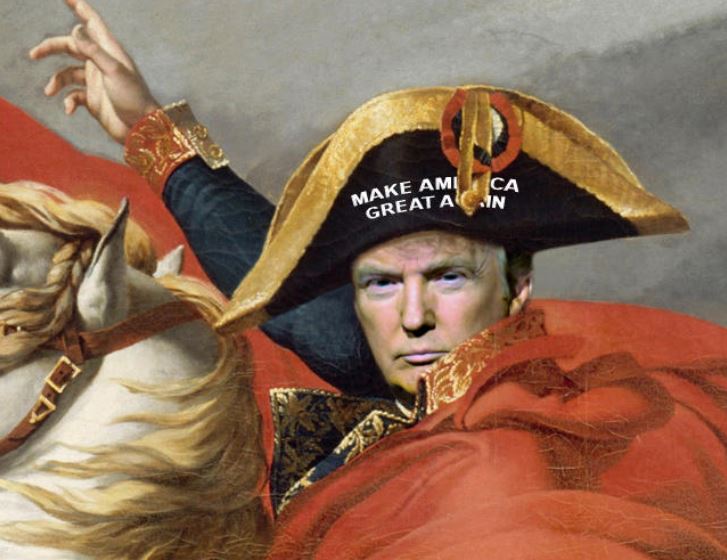Well, the craziness of yesterday has subsided, and I’m almost finished with report cards. Student-musicians apparently did quite well at their Music Festival, and life is (hopefully) about to calm down a bit before getting insane all over again in about five or six weeks.
All that said, I’m still pretty worn-out today. Fortunately, my good blogger buddy photog, proprietor of Orion’s Cold Fire, wrote a post yesterday, “Building on Trump’s Revolt,” which raises some interesting questions. Foremost at the back of every Trumpist’s mind: who takes over after Trump?
It’s a compelling question. As I see it, there is no figure out that who adequately capture Trump’s appeal, much less his uniquely abrasive-yet-charming style. Trump, like Napoleon, is sui generis, a man until himself. photog argues that Trump must name some successor, either implicitly (via a VP pick or important cabinet appointment) or explicitly.
I’ve had a similar thought, and my mind always turns to Theodore Roosevelt, probably the closest parallel to a Trumpian president other than Andrew Jackson. Roosevelt left office after serving about seven-and-a-half years (he took office in 1901 upon the death of President William McKinley, then ran for a full-term in his own right). When he left, he named William Howard Taft his successor, which secured Taft the Republican nomination and the presidency in 1908.
Of course, students of history know how that turned out: Roosevelt was perpetually dissatisfied with Taft’s performance (Roosevelt was a Progressive Republican, whereas Taft—who had some Progressive inclinations—was supported and influenced by the “Old Guard” ranks of more conservative Republicans). Soon, Roosevelt began criticizing Taft’s policy decisions publicly, especially Taft’s (justified) firing of the Chief US Foreseter and close Roosevelt ally, Gifford Pinchot.
I love Trump, but it’s not hard to envision a similar scenario: he names a successor (say Pence) who is on-board with the MAGA agenda, but who has a more “respectable” political pedigree and ties to the old guard (the Establishment GOP). President Pence consolidates the gains Trump made (just as Taft continued busting up trusts—double that of Roosevelt—during his tenure), but makes some decisions with which the former president disagrees. Suddenly, Twitter lights up with Trump’s critical tweets of President Pence’s misguided decision-making.
On the other hand, Trump tends to lash out when he feels personally attacked. Pence, having worked with the man for (in this scenario, presumably) eight years, would know how to avoid those landmines. But replace Pence with a more ornery Republican, like Nikki Haley, who was Trump-skeptical. My Roosevelt-Taft scenario could play out there.
Regardless, the need for a strong successor, true to the spirit of the MAGA movement, is a solid recommendation from photog. He also points to the need for real nationwide organization, not just “e-mails and letters hounding us for donations.” That is key to sustaining the momentum from the Trump administration. Z-Man has been hammering away at this issue in some of his podcasts.
Let’s face it: Trump won’t be in office forever, all GEOTUS joking aside. Even if we somehow amended the Constitution to make that possible (probably not a desirable outcome, and one that would likely see the West Coast secede from the Union—good riddance!), Trump’s already in his seventies. If we’re lucky we’d get maybe another decade of good times (that diet of fast food does seem to be preserving President Trump nicely, though).
Give photog’s essay a read. Even if Trump wins in 2020 (which I expect he will), we need to be planning for 2024 now.



Hey, I like that analogy to Teddy. Both are hard acts to follow.
LikeLiked by 1 person
Yes, I don’t think there’s another Trump waiting in the wings (thus, “sui generis”).
LikeLike
In my mind, you’re right on the TR analogy. Been much in my mind lately.
LikeLiked by 1 person
Thanks, NEO. I’m sure the analogy has occurred to others, too. I can easily see Trump being critical of even his hand-picked successor, but I’d like to think that he wouldn’t, so long as his successor isn’t calling _Trump_ out specifically. I love the guy, but he does struggle with exercising self-restraint when he is criticized directly. Still the best POTUS of the twenty-first century!
LikeLiked by 1 person
He does, as did TR. I am coming to think he may be the best since Coolidge, much as I love Ronaldus.
LikeLiked by 1 person
Yes, agreed. Donaldus Magnus deserves a second term (and maybe a third).
LikeLiked by 1 person
It would have to be like Grover’s second, cause we’ll never get it done by 2024, and it might be as bad as TR 1912 run turned out. But I share the feeling.
LikeLiked by 1 person